- Home
- Franklin W. Dixon
The Tower Treasure thb-1 Page 7
The Tower Treasure thb-1 Read online
Page 7
watch and money and a diamond ring I had lying by the mirror, took this wig
and a couple of others that were around, and beat it. Nobody saw him come
or go. Must have got in by that window."
Morley talked in short, rapid sentences, and there was no mistaking his
sincerity.
"All the wigs were red," he stated. "I didn't worry so much about the other
wigs, because they were for old plays, but this one was being used right
along. Kauffman made it specially for me. I had to get him to make another.
But say-where did you find it?"
"Oh, my sons located it during some detective work we're on. The crook left
this behind. I was trying to trace him by it."
Morley did not inquire further. "That's all the help I can give you," he said.
"The police never did learn who cleaned out my dressing room,"
"Too bad. Well, I'll probably get him some other way. Give me a list and
description of the articles he took from you. Probably I can trace him through
that."
"Glad to," said Morley. He reached into a drawer and drew out a sheet of
paper which he handed to the detective. "That's the same list I gave the
police when I reported the robbery. Number of the watch, and everything. I
didn't bother to mention the wigs. Figured they wouldn't be in any condition
to wear if I did get them back."
Mr. Hardy folded the list and put it in his pocket. Morley glanced at his
watch, lying face up beside the mirror, and gave an exclamation. "Suffering
Sebastopol! Curtain in five minutes and I'm not half made up yet. Excuse me,
folks, but I've got to get on my horse. In this business I'll be ready in a
minute' doesn't go."
He seized a stick of grease paint and feverishly resumed the task of altering
his appearance to that of the character he was portraying at that evening's
performance. Mr. Hardy and his sons left. They made their way out to the
street.
"Not much luck there," Frank commented.
"Except through Mr. Morley's stolen jewelry," his father reminded him. "If
that's located in a pawnshop, it may lead to the thief. Well, boys, would you
like to go into the theater via the front entrance and see the show?"
"Yes, Dad," the brothers replied, and Joe added, "Tomorrow we'll try to find
out the name and address of the thief through his coat and hat?"
"Right," the detective said.
The Hardys enjoyed the performance of The Merchant of Venice with Mr.
Morley as Launcelot Gobbo, and laughed hilariously at his comedy and
gestures.
The next morning the detective and his sons visited the store from which the
thief's jacket and hat had been purchased. They were told that the styles
were three years out of date and there was no way to tell who had bought
them.
"The articles," the head of the men's suit department suggested, "may have
been picked up more recently at a secondhand clothing store." The Hardys
thanked him and left.
"All this trip for nothing." Joe gave a sigh.
His father laid a hand on the boy's shoulder. "A good detective," he said,
"never sighs with discouragement nor becomes impatient. It took years of
persistence to solve some famous cases."
He suggested that their next effort be devoted to doing some research in the
city's police files. Since Mr. Hardy had formerly been a member of the New
York City detective force, he was permitted to search the records at any
time.
Frank and Joe accompanied him to headquarters and the work began. First
came a run-down on any known New York criminals who used disguises. Of
these men, the Hardys took the reports on the ones who were thin and of
medium height.
Next came a check by telephone on the whereabouts of these people. All
could be accounted for as working some distance from Bayport at the time of
the thefts, with one exception.
"I'll bet he's our man!" Frank exclaimed. "But where is he now?"
CHAPTER XI
Anxious Waiting
THE suspect, the Hardys learned, was out of prison on parole. His name was
John Jackley, but he was known as Red Jackley because when caught before
going to prison he had been wearing a red wig.
"He lives right here in New York, and maybe he's back home by this time,"
Joe spoke up. "Let's go see him."
"Just a minute," Mr. Hardy said, holding up his hand. "I don't like to leave
Mother alone so long. Besides, in this type of sleuthing three detectives
together are too noticeable to a crook. This Jackley may or may not be our
man. But if he is, he's probably dangerous. I want you boys to take the
evening plane home. I'll phone the house the minute the thief is in custody."
"All right, Dad," his sons chorused, though secretly disappointed that they
had to leave.
When they reached home, Frank and Joe learned that their mother had been
working on the case from a completely different angle. Hers was the
humanitarian side.
"I went to call on the Robinsons to try to bolster their spirits," she said. "I
told them about your trip to New York and that seemed to cheer them a lot.
Monday I'm going to bake a ham and a cake for you to take to them. Mrs.
Robinson isn't well and can do little in the kitchen."
"That's swell of you!" Frank said admiringly. "I'll go."
Joe told them he had a tennis match to play. "I'll do the next errand," he
promised.
Monday, during a change of classes, Frank met Callie Shaw in the corridor.
"Hit" she said. "What great problem is on Detective Hardy's mind? You look
as if you'd lost your best criminal!"
Frank grimaced. "Maybe I have," he said.
He told Callie that he had phoned home at noon confidently expecting to hear
that his father had reported the arrest of the real thief of the Apple-gate
money and the exoneration of Mr. Robinson. "But there was no word, Callie,
and I'm worried Dad may be in danger."
"I don't blame you," she said. "What do you think has happened?"
"Well, you never can tell when you're dealing with criminals."
"Now, Frank, you're not trying to tell me your father would let himself get
trapped?" Callie said.
"No, I don't think he would, Callie. Maybe Dad hasn't returned because he
still hasn't found the man he was looking for."
"Well, I certainly hope that thief is caught," said Callie. "But, Frank, nobody
really believes Mr. Robinson did it!"
"Nobody but Hurd Applegate and the men who employ people. Until they find
the man who did take the stuff, Mr. Robinson is out of a job."
"I'm going over to see the Robinsons soon. Where are they living?"
Frank gave Callie the address. Her eyes widened. "Why, that's in one of the
poorest sections of the city! Frank, I had no idea the Robinsons' plight was
that bad!"
"It is-and it'll be a lot worse unless Mr. Robinson gets work pretty soon.
Slim's earnings aren't enough to take care of the whole family. Say, Callie,
how about going over to the Robinsons' with me after school? Mother's
sending a ham and a cake."
"I'd love to," Callie agreed. The two parted at the door of the algebra
teacher's clas
sroom.
As soon as the last bell had rung, Frank and Callie left the building together.
First they stopped at the Shaw house to leave the girl's books.
"I think I'll take some fruit to the Robinsons," Callie said, and quickly filled
a bag with oranges, bananas, and grapes.
When the couple reached the Hardy home, Frank asked his mother if any
messages had come. "No, not yet," she answered.
Frank said nothing to her about being concerned over his father, as he
tucked the ham under one arm and picked up the cakebox. But after he and
Callie reached the street, he again confided his concern to Callie.
"It does seem strange you haven't heard anything," she admitted. "But don't
forget the old saying, 'No news is good news,' so don't worry."
"I'll take your advice," Frank agreed. "No use wearing a sour look around
the Robinsons."
"Or when you're with me, either," Callie said, tossing her head teasingly.
Frank hailed an approaching bus bound for the section of the city in which
the Robinsons lived. He and Callie climbed aboard. It was a long ride and the
streets became less attractive as they neared the outskirts of Bayport.
"It's a shame, that's what it is!" declared Callie abruptly. "The Robinsons
were always accustomed to having everything so nice! And now they have to
live here! Oh, I hope your father catches the man who committed that
robbery-and soon!"
Her eyes flashed and for a moment she looked so fierce that Frank laughed.
"I suppose you'd like to be the judge and jury at his trial, eh?"
"I'd give him a hundred years in jail!" Callie declared.
When they came to the street where the Robinsons had moved they found
that it was an even poorer thoroughfare than they had expected. There were
small houses badly in need of paint and repairs. Shabbily dressed children
were playing in the roadway.
At the far end of the street stood a small cottage that somehow contrived to
look homelike in spite of the surroundings. The picket fence had been
repaired and the yard had been cleaned up.
"This is where they live," said Frank.
Callie smiled. "It's the neatest place on the whole street."
Paula and Tessie answered their knock. The twins' faces lighted up with
pleasure when they saw who the callers were.
"Frank and Callie!" they exclaimed. "Come in."
The callers were greeted with kindly dignity by Mrs. Robinson. She looked
pale and thin but had the same self-possession she had always shown at
Tower Mansion.
"We can't stay long," Callie explained. "But Frank and I just thought we'd
run out to see how you all are. And we brought something for you."
The fruit, ham, and cake were presented. As the twins ohed and ahed over
the food, Mrs. Robinson's eyes filled with tears, "You are dear people," she
said. "Frank, tell your mother I can't thank her enough."
Frank grinned as Mrs. Robinson went on, "Callie, we shall enjoy this fruit
very much. Many thanks."
Paula said, "It's a wonderful gift. Say, did you know Perry got a better job
the second day he was at the supermarket?"
"No. That's swell," Frank replied. "It didn't take the manager long to find
out how smart Slim is, eh?"
The twins giggled, but Mrs. Robinson said dolefully, "I wish my husband
could find a job. Since no one around here will employ him, he is thinking of
going to another city to get work."
"And leave you here?"
"I suppose so. We don't know what to do."
"It's so unfair!" Paula flared up. "My father didn't have a thing to do with
that miserable robbery, and yet he has to suffer for it just the same!"
Mrs. Robinson said to Frank hesitantly, "Has Mr. Hardy discovered
anything-yet?"
"I don't know," Frank admitted. "We haven't heard from him. He's been in
New York following up some clues. But so far there's been no word."
"We hardly dare hope that he'll be able to clear Mr. Robinson," the woman
said sorrowfully. "The whole case is so mysterious."
"I've stopped thinking of it," Tessie declared. "If the mystery is cleared up,
okay. If it isn't-we won't starve, at any rate, and my father knows we believe
in him."
"Yes, I suppose it doesn't do much good to keep talking about it," agreed
Mrs. Robinson. "We've gone over the whole matter so thoroughly that there
is nothing more to say."
So, by tacit consent, the subject was changed and for the rest of their stay
Frank and Callie chatted of doings at school. Mrs. Robinson and the girls
invited them to remain for supper, but Callie insisted that she must go. As
they were leaving, Mrs. Robinson drew Frank to one side.
"Promise me one thing," she said. "Let me know as soon as your father
returns-that is, if he has any news."
"I'll do that, Mrs. Robinson," Frank agreed. "I know what this suspense
must be like for you and the twins."
"It's terrible. But as long as Fenton Hardy-and his sons-are working on the
case, I'm sure it will be straightened out."
Callie and Frank were unusually silent all the way home. They had been
profoundly affected by the change that the Tower Mansion mystery had
caused in the lives of the Robinsons. Callie lived but a few blocks from the
Hardy home, and Frank accompanied her to the door.
"See you tomorrow," he said.
"Yes, Frank. And I hope you'll hear good news from your father."
The boy quickened his steps and ran eagerly into the Hardy house. Joe met
him.
"Any phone call?"
Joe shook his head. "Mother's pretty worried that something has happened
to Dad."
CHAPTER XII
A Disturbing Absence
ANOTHER whole day went by. When still no word had come from Mr.
Hardy, his wife phoned the New York hotel. She was told that the detective
had checked out the day before.
Discouraged and nervous about the new mystery of their father's
disappearance, Frank and Joe found it almost impossible to concentrate on
their studies.
Then, the following morning when Mrs. Hardy came to awaken them, she
wore a broad smile. "Your father is home!" she said excitedly. "He's all right
but has had a bad time. He's asleep now and will tell you everything after
school."
The boys were wild with impatience to learn the outcome of his trip, but they
were obliged to curb their curiosity.
"Dad must be mighty tired," Joe remarked, as Mrs. Hardy went downstairs
to start breakfast. "I wonder where he came from."
"Probably he was up all night. When he's working on a case, he forgets
about sleep. Do you think he found out anything?"
"Hope so, Frank. I wish he'd wake up and tell us. I hate to go back to school
without knowing."
But Mr. Hardy had not awakened by the time the boys set out for school,
although they lingered until they were in danger of being late. As soon as
classes were over, they shattered all records in their race home.
Fenton Hardy was in the living room, and as they rushed in panting, he
grinned broadly. He looked refreshed after his long sleep and it was evident
that his trip had not been entire
ly without success, for his manner was
cheerful.
"Hello, boys! Sorry I worried you and Mother."
"What luck, Dad?" asked Frank.
"Good and bad. Here's the story: I went to the house where Red Jackley was
boarding. Although he seemed to be an exemplary parolee, I decided to watch
him a while and try to make friends."
"How could you do that?"
"By taking a room in the same house and pretending to be a fellow
criminal."
"Wow!" Joe cried. "And then?"
"Jackley himself spoiled everything. He got mixed up in a jewel robbery and
cleared out of the city. Luckily, I heard him packing, and I trailed him. The
police were watching for him and he couldn't get out of town by plane or bus.
He outwitted the police by jumping a freight on the railroad."
"And you still followed?"
"I lost him two or three times, but fortunately I managed to pick up his trail
again. He got out of the city and into upper New York State. Then his luck
failed him. A railroad detective recognized Jackley and the chase was on. Up
to that time I had been content with just keeping behind him. I had still hoped
to pose as a fellow fugitive and win his confidence. But when the pursuit
started in earnest, I had to join the officers."
"And they caught Jackley?"
"Not without great difficulty. Jackley, by the way, was once a railroad man.
Strangely enough, he worked not many miles from here. He managed to steal
a railroad handcar and got away from us. But he didn't last long, for the
handcar jumped the tracks on a curve and Jackley was badly smashed up."
"Killed?" Frank asked quickly.
"No. But he's in a hospital right now and the doctors say he hasn't much of a
chance."
"He's under arrest?"
"Oh, yes. He's being held for the jewel thefts and also for the theft from the
actor's dressing room. But he probably won't live to answer either charge."
"Didn't you find out anything that would connect him with the Tower
robbery?"
"Not a thing."
The boys were disappointed, and their expressions showed it. If Red Jackley
died without confessing, the secret of the Tower robbery would die with him.
Mr. Robinson might never be cleared. He might be doomed to spend the rest
of his life under a cloud, suspected of being a thief.
"Have you talked to Jackley?" Frank asked.

 The Great Pumpkin Smash
The Great Pumpkin Smash Who Let the Frogs Out?
Who Let the Frogs Out? Return to Black Bear Mountain
Return to Black Bear Mountain A Treacherous Tide
A Treacherous Tide Bug-Napped
Bug-Napped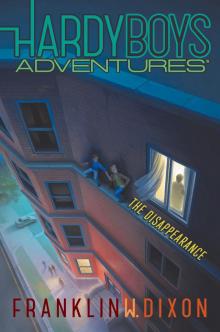 The Disappearance
The Disappearance Sea Life Secrets
Sea Life Secrets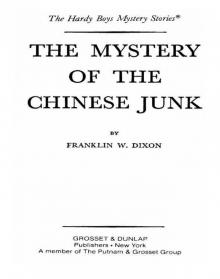 The Mystery of the Chinese Junk
The Mystery of the Chinese Junk A Skateboard Cat-astrophe
A Skateboard Cat-astrophe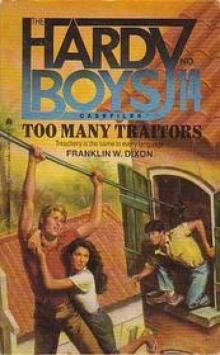 Too Many Traitors
Too Many Traitors Galaxy X
Galaxy X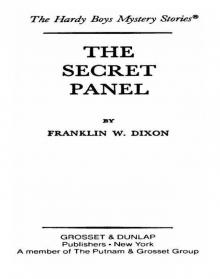 The Secret Panel
The Secret Panel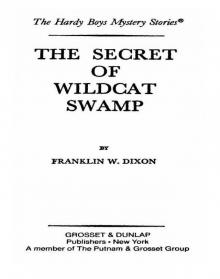 The Secret of Wildcat Swamp
The Secret of Wildcat Swamp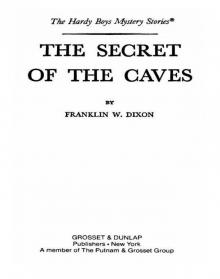 The Secret of the Caves
The Secret of the Caves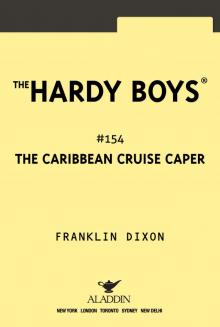 The Caribbean Cruise Caper
The Caribbean Cruise Caper Without a Trace
Without a Trace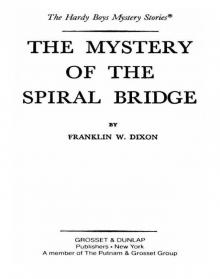 The Mystery of the Spiral Bridge
The Mystery of the Spiral Bridge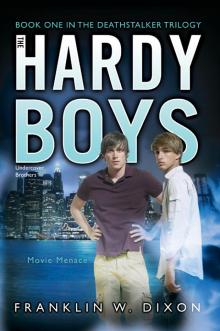 Movie Menace
Movie Menace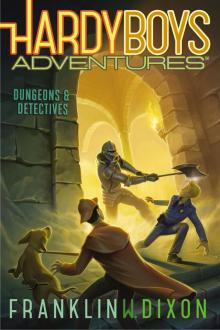 Dungeons & Detectives
Dungeons & Detectives Water-Ski Wipeout
Water-Ski Wipeout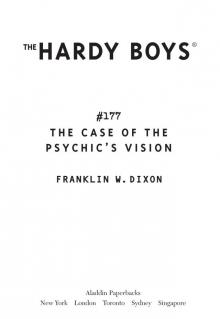 The Case of the Psychic's Vision
The Case of the Psychic's Vision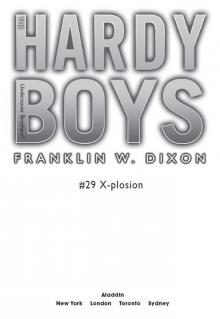 X-plosion
X-plosion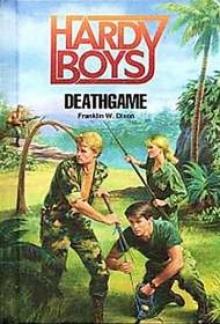 Deathgame
Deathgame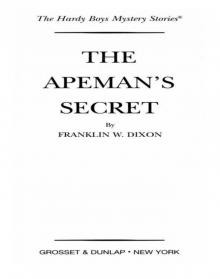 The Apeman's Secret
The Apeman's Secret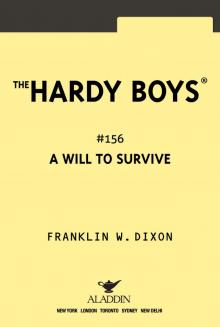 A Will to Survive
A Will to Survive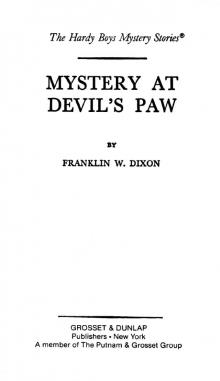 Mystery at Devil's Paw
Mystery at Devil's Paw Blood Money
Blood Money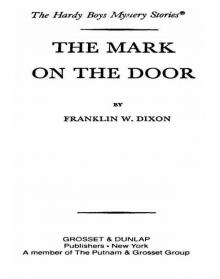 The Mark on the Door
The Mark on the Door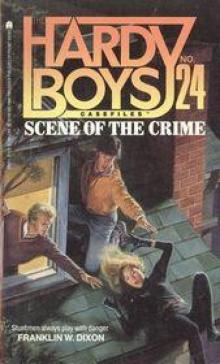 Scene of the Crime
Scene of the Crime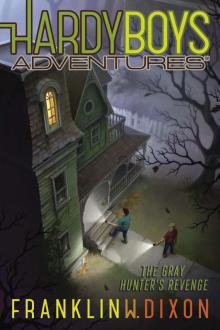 The Gray Hunter's Revenge
The Gray Hunter's Revenge Stolen Identity
Stolen Identity The Mummy's Curse
The Mummy's Curse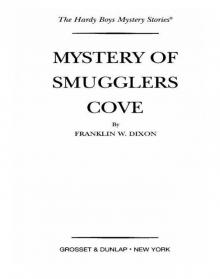 Mystery of Smugglers Cove
Mystery of Smugglers Cove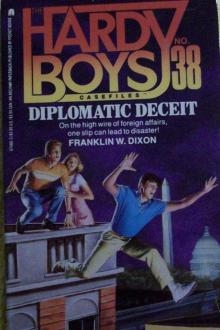 Diplomatic Deceit
Diplomatic Deceit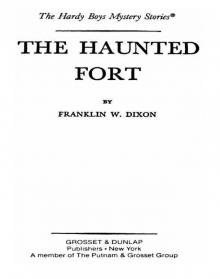 The Haunted Fort
The Haunted Fort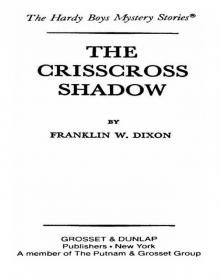 The Crisscross Shadow
The Crisscross Shadow Secret of the Red Arrow
Secret of the Red Arrow Trial and Terror
Trial and Terror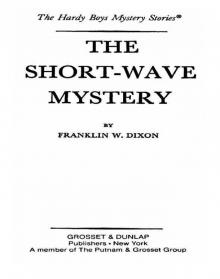 The Short-Wave Mystery
The Short-Wave Mystery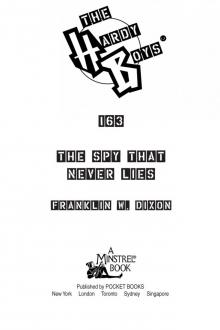 The Spy That Never Lies
The Spy That Never Lies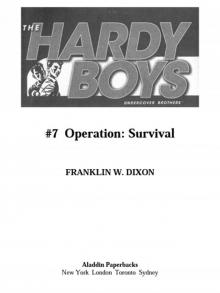 Operation: Survival
Operation: Survival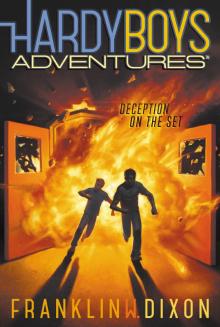 Deception on the Set
Deception on the Set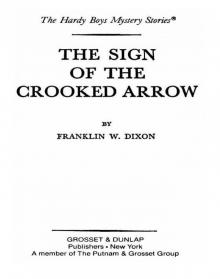 The Sign of the Crooked Arrow
The Sign of the Crooked Arrow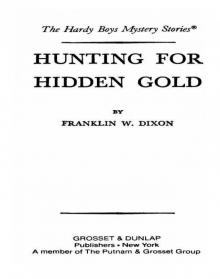 Hunting for Hidden Gold
Hunting for Hidden Gold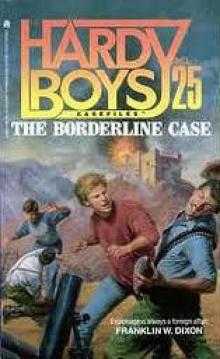 Disaster for Hire
Disaster for Hire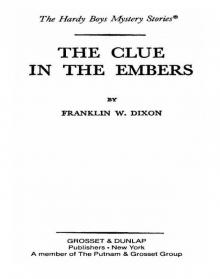 The Clue in the Embers
The Clue in the Embers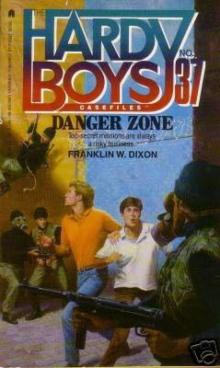 Danger Zone
Danger Zone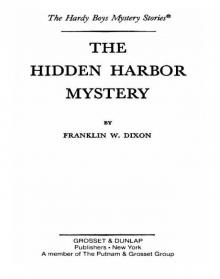 The Hidden Harbor Mystery
The Hidden Harbor Mystery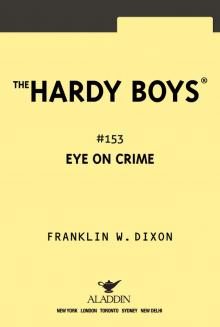 Eye on Crime
Eye on Crime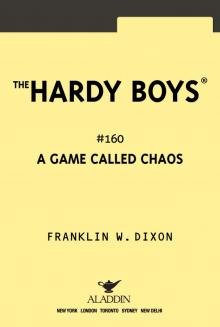 A Game Called Chaos
A Game Called Chaos The Bicycle Thief
The Bicycle Thief The Missing Playbook
The Missing Playbook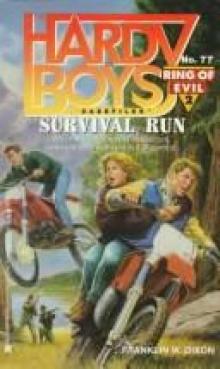 Survival Run
Survival Run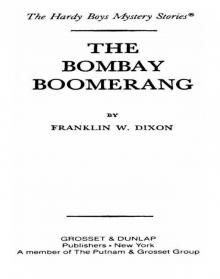 The Bombay Boomerang
The Bombay Boomerang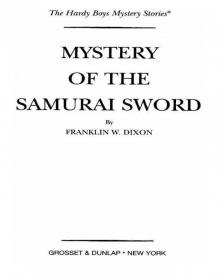 Mystery of the Samurai Sword
Mystery of the Samurai Sword Burned
Burned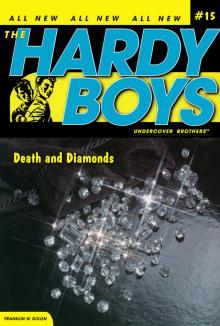 Death and Diamonds
Death and Diamonds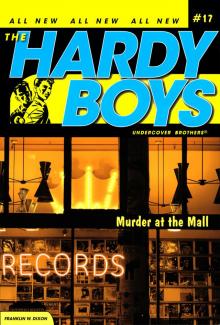 Murder at the Mall
Murder at the Mall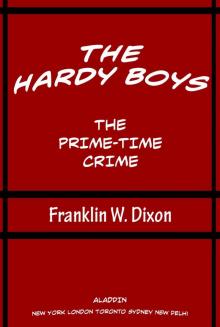 The Prime-Time Crime
The Prime-Time Crime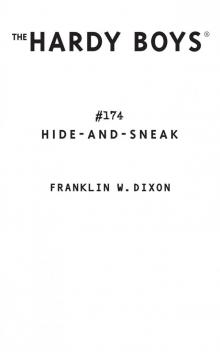 Hide-and-Sneak
Hide-and-Sneak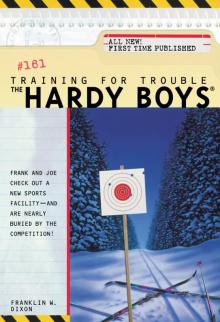 Training for Trouble
Training for Trouble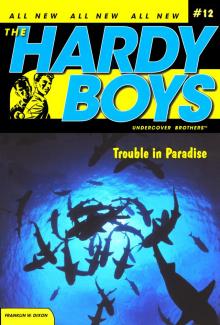 Trouble in Paradise
Trouble in Paradise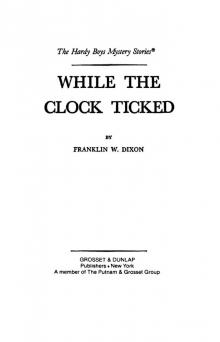 While the Clock Ticked
While the Clock Ticked The Alaskan Adventure
The Alaskan Adventure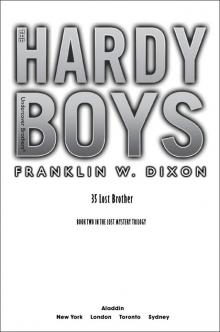 The Lost Brother
The Lost Brother Tunnel of Secrets
Tunnel of Secrets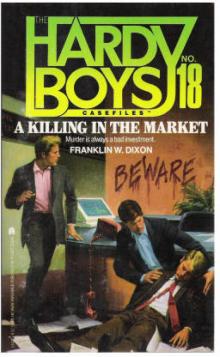 A Killing in the Market
A Killing in the Market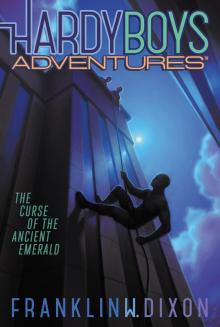 The Curse of the Ancient Emerald
The Curse of the Ancient Emerald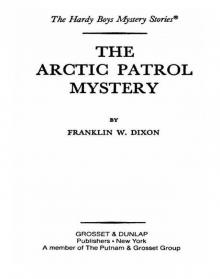 The Arctic Patrol Mystery
The Arctic Patrol Mystery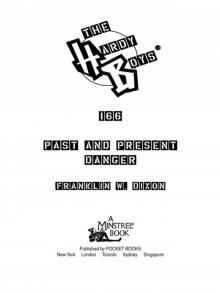 Past and Present Danger
Past and Present Danger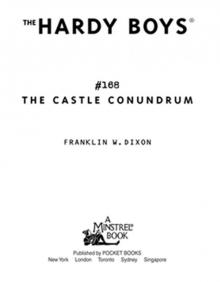 The Castle Conundrum (Hardy Boys)
The Castle Conundrum (Hardy Boys)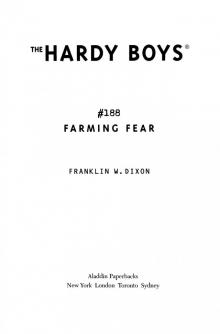 Farming Fear
Farming Fear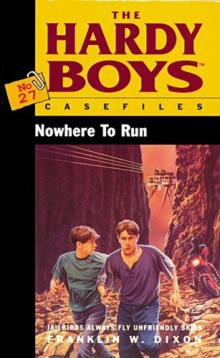 Nowhere to Run
Nowhere to Run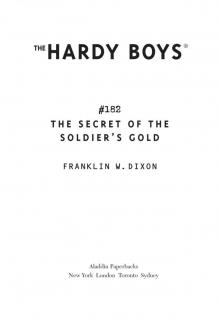 The Secret of the Soldier's Gold
The Secret of the Soldier's Gold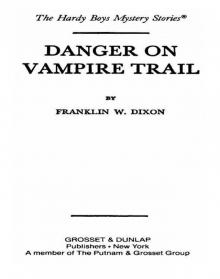 Danger on Vampire Trail
Danger on Vampire Trail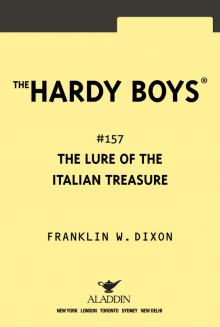 The Lure of the Italian Treasure
The Lure of the Italian Treasure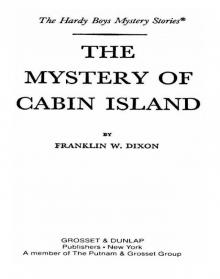 The Mystery of Cabin Island
The Mystery of Cabin Island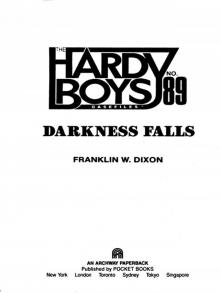 Darkness Falls
Darkness Falls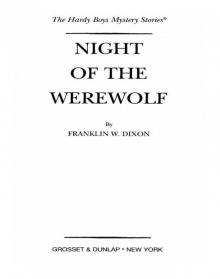 Night of the Werewolf
Night of the Werewolf Danger in the Extreme
Danger in the Extreme The Lazarus Plot
The Lazarus Plot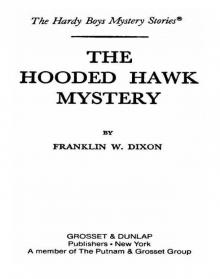 The Hooded Hawk Mystery
The Hooded Hawk Mystery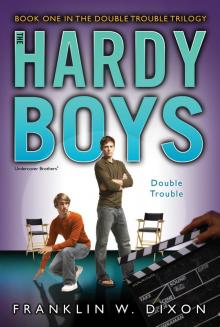 Double Trouble
Double Trouble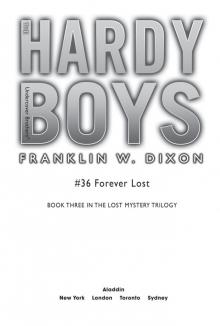 Forever Lost
Forever Lost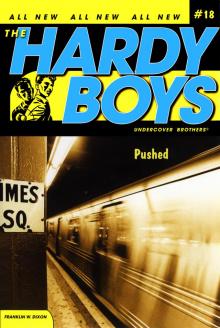 Pushed
Pushed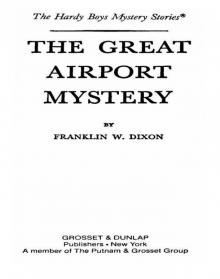 The Great Airport Mystery
The Great Airport Mystery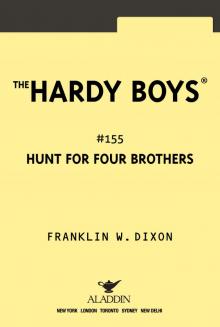 The Hunt for Four Brothers
The Hunt for Four Brothers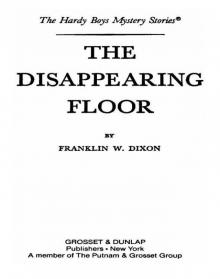 The Disappearing Floor
The Disappearing Floor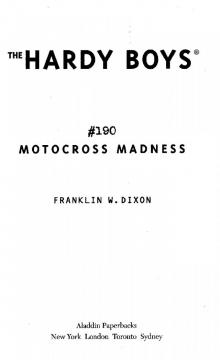 Motocross Madness
Motocross Madness Foul Play
Foul Play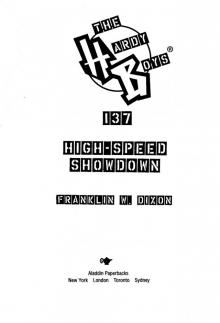 High-Speed Showdown
High-Speed Showdown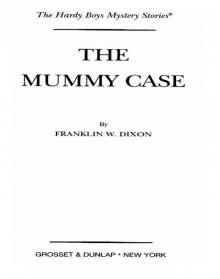 The Mummy Case
The Mummy Case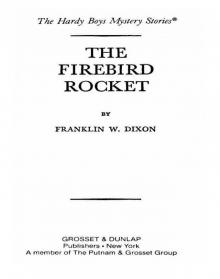 The Firebird Rocket
The Firebird Rocket Trouble in Warp Space
Trouble in Warp Space Ship of Secrets
Ship of Secrets Line of Fire
Line of Fire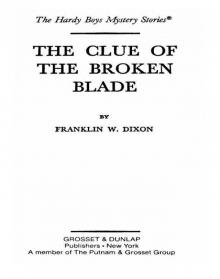 The Clue of the Broken Blade
The Clue of the Broken Blade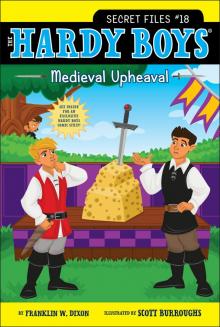 Medieval Upheaval
Medieval Upheaval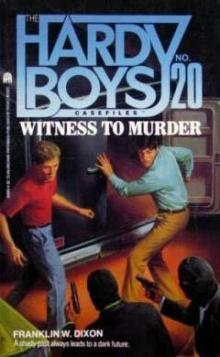 Witness to Murder
Witness to Murder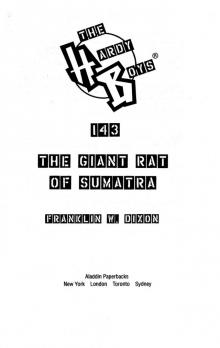 The Giant Rat of Sumatra
The Giant Rat of Sumatra Attack of the Bayport Beast
Attack of the Bayport Beast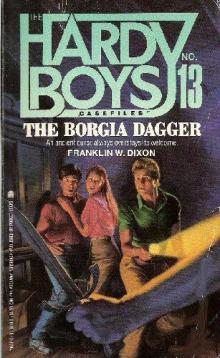 The Borgia Dagger
The Borgia Dagger Scavenger Hunt Heist
Scavenger Hunt Heist No Way Out
No Way Out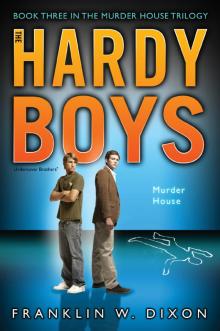 Murder House
Murder House The X-Factor
The X-Factor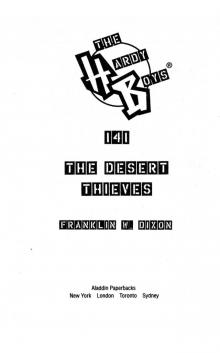 The Desert Thieves
The Desert Thieves Mystery of the Phantom Heist
Mystery of the Phantom Heist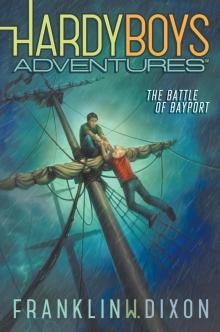 The Battle of Bayport
The Battle of Bayport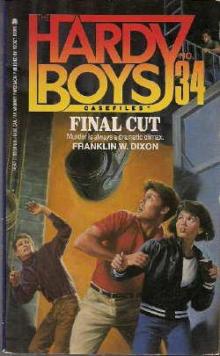 Final Cut
Final Cut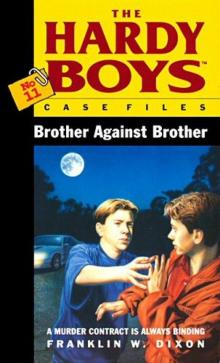 Brother Against Brother
Brother Against Brother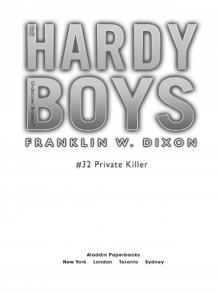 Private Killer
Private Killer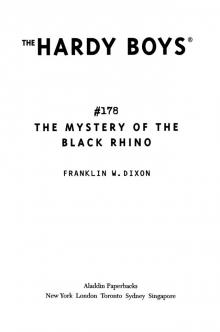 The Mystery of the Black Rhino
The Mystery of the Black Rhino Feeding Frenzy
Feeding Frenzy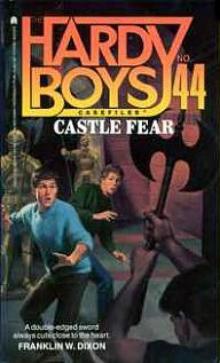 Castle Fear
Castle Fear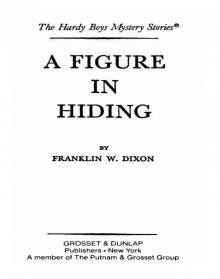 A Figure in Hiding
A Figure in Hiding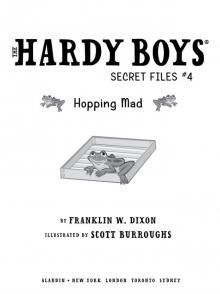 Hopping Mad
Hopping Mad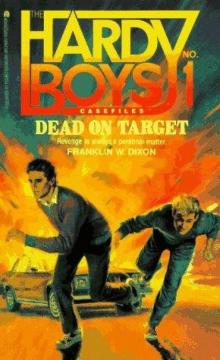 Dead on Target
Dead on Target Skin and Bones
Skin and Bones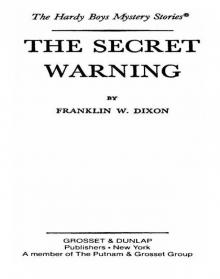 The Secret Warning
The Secret Warning Flesh and Blood
Flesh and Blood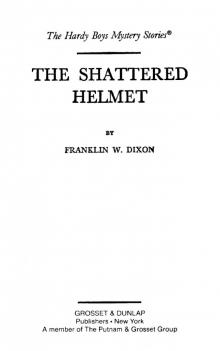 The Shattered Helmet
The Shattered Helmet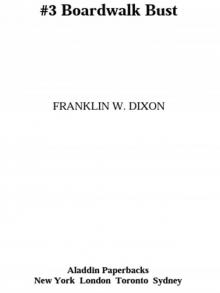 Boardwalk Bust
Boardwalk Bust Terror at High Tide
Terror at High Tide In Plane Sight
In Plane Sight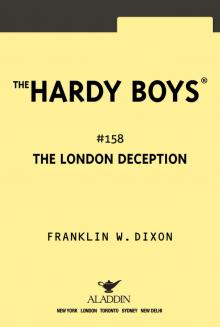 The London Deception
The London Deception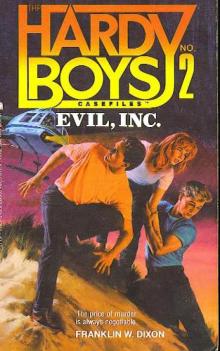 Evil, Inc.
Evil, Inc.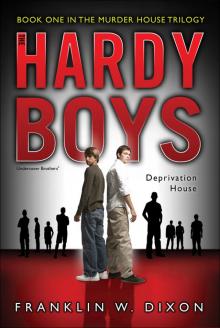 Deprivation House
Deprivation House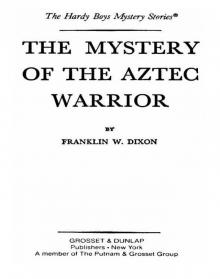 The Mystery of the Aztec Warrior
The Mystery of the Aztec Warrior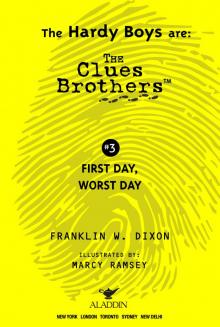 First Day, Worst Day
First Day, Worst Day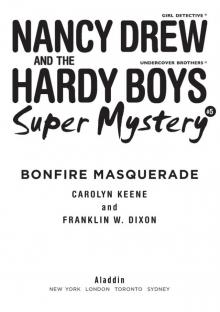 Bonfire Masquerade
Bonfire Masquerade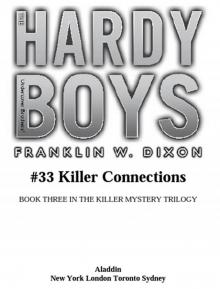 Killer Connections
Killer Connections Strategic Moves
Strategic Moves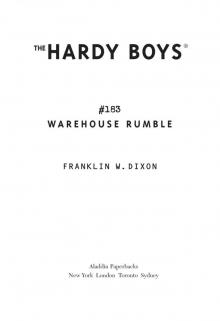 Warehouse Rumble
Warehouse Rumble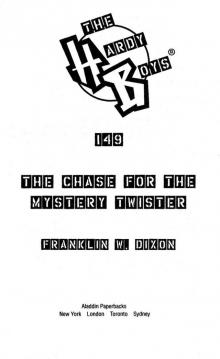 The Chase for the Mystery Twister
The Chase for the Mystery Twister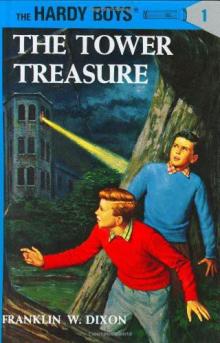 The Tower Treasure thb-1
The Tower Treasure thb-1 The Children of the Lost
The Children of the Lost The Last Laugh
The Last Laugh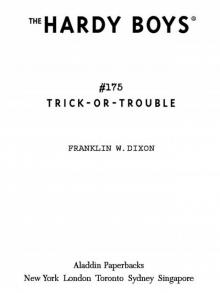 Trick-or-Trouble
Trick-or-Trouble Perfect Getaway
Perfect Getaway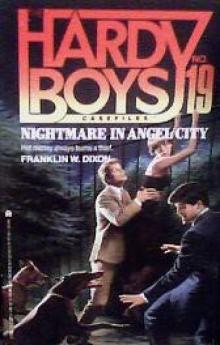 Nightmare in Angel City
Nightmare in Angel City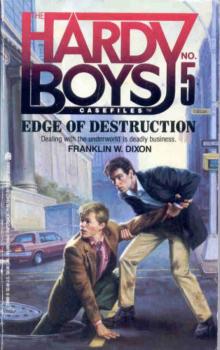 Edge of Destruction
Edge of Destruction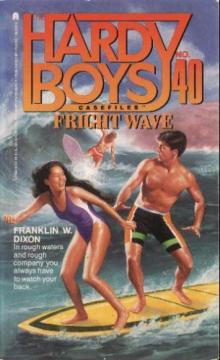 Fright Wave
Fright Wave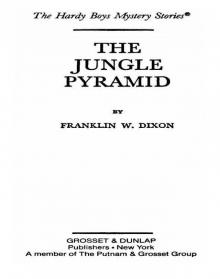 The Jungle Pyramid
The Jungle Pyramid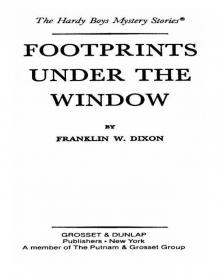 Footprints Under the Window
Footprints Under the Window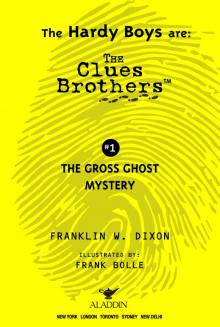 The Gross Ghost Mystery
The Gross Ghost Mystery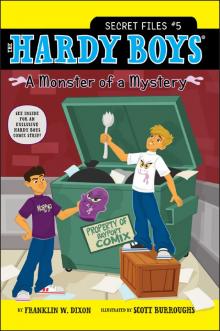 A Monster of a Mystery
A Monster of a Mystery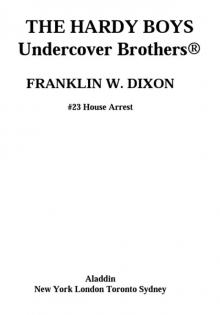 House Arrest
House Arrest Mystery of the Desert Giant
Mystery of the Desert Giant Talent Show Tricks
Talent Show Tricks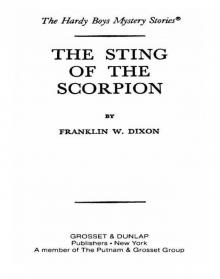 The Sting of the Scorpion
The Sting of the Scorpion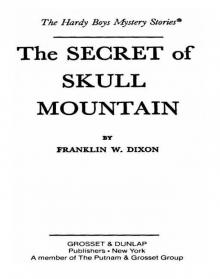 The Secret of Skull Mountain
The Secret of Skull Mountain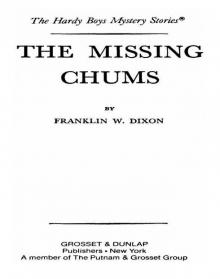 The Missing Chums
The Missing Chums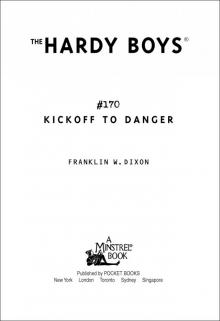 Kickoff to Danger
Kickoff to Danger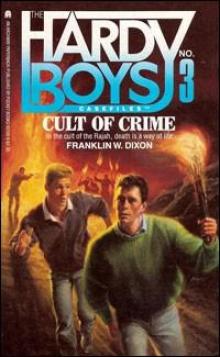 Cult of Crime
Cult of Crime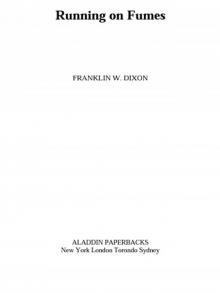 Running on Fumes
Running on Fumes Martial Law
Martial Law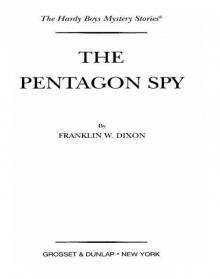 The Pentagon Spy
The Pentagon Spy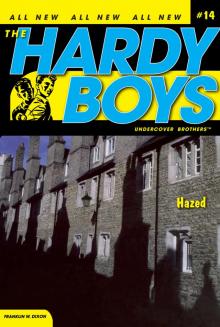 Hazed
Hazed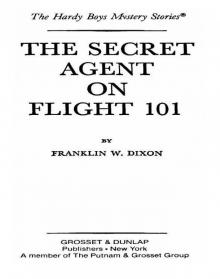 The Secret Agent on Flight 101
The Secret Agent on Flight 101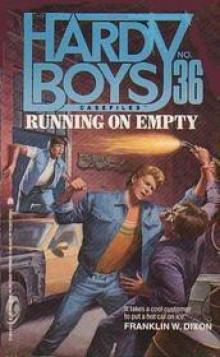 Running on Empty
Running on Empty Top Ten Ways to Die
Top Ten Ways to Die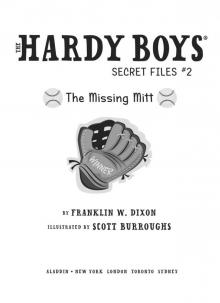 The Missing Mitt
The Missing Mitt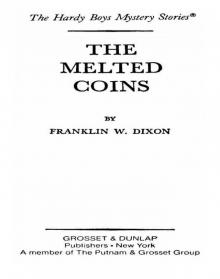 The Melted Coins
The Melted Coins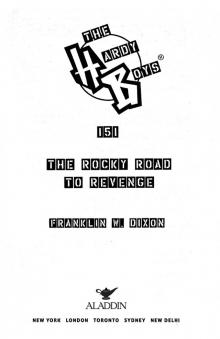 The Rocky Road to Revenge
The Rocky Road to Revenge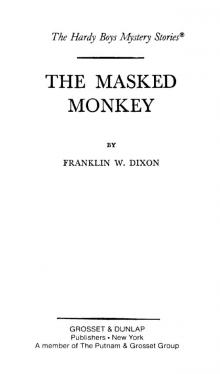 The Masked Monkey
The Masked Monkey Lost in Gator Swamp
Lost in Gator Swamp Extreme Danger
Extreme Danger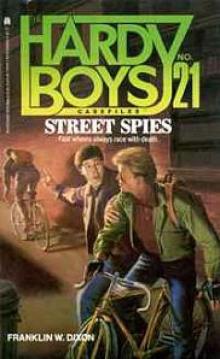 Street Spies
Street Spies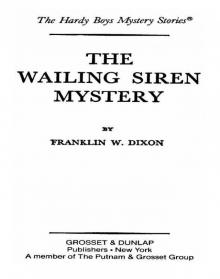 The Wailing Siren Mystery
The Wailing Siren Mystery The Dangerous Transmission
The Dangerous Transmission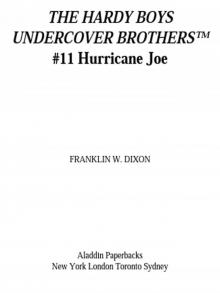 Hurricane Joe
Hurricane Joe The Crisscross Crime
The Crisscross Crime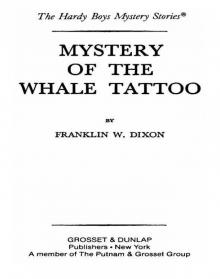 Mystery of the Whale Tattoo
Mystery of the Whale Tattoo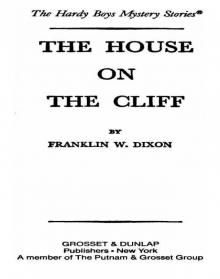 The House on the Cliff
The House on the Cliff Camping Chaos
Camping Chaos Ghost of a Chance
Ghost of a Chance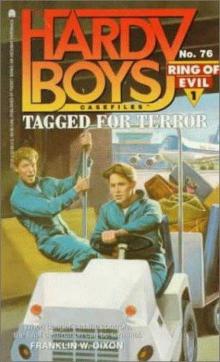 Tagged for Terror
Tagged for Terror Thrill Ride
Thrill Ride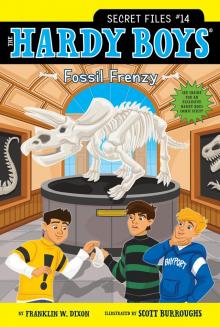 Fossil Frenzy
Fossil Frenzy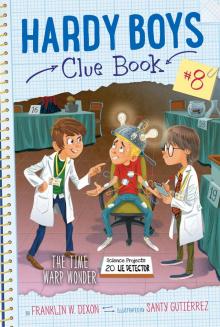 The Time Warp Wonder
The Time Warp Wonder Ghost Stories
Ghost Stories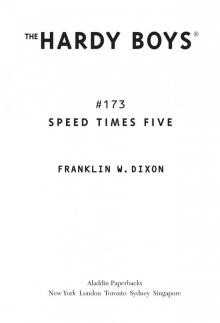 Speed Times Five
Speed Times Five What Happened at Midnight
What Happened at Midnight Three-Ring Terror
Three-Ring Terror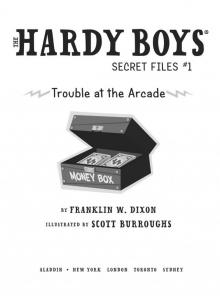 Trouble at the Arcade
Trouble at the Arcade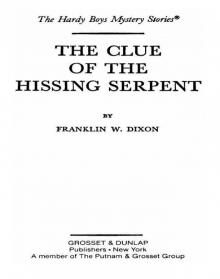 The Clue of the Hissing Serpent
The Clue of the Hissing Serpent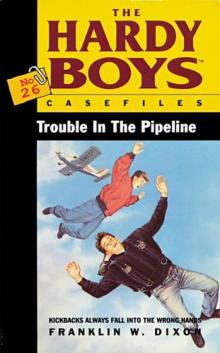 Trouble in the Pipeline
Trouble in the Pipeline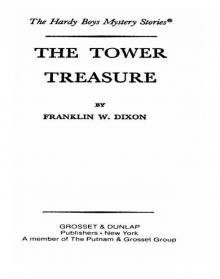 The Tower Treasure
The Tower Treasure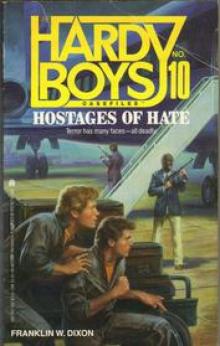 Hostages of Hate
Hostages of Hate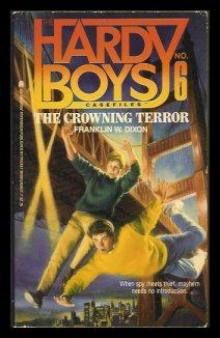 The Crowning Terror
The Crowning Terror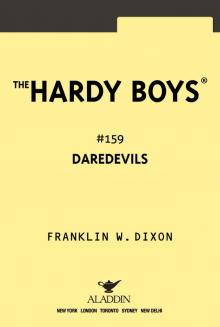 Daredevils
Daredevils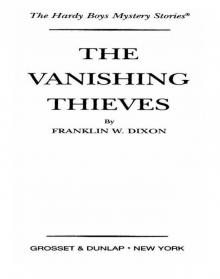 The Vanishing Thieves
The Vanishing Thieves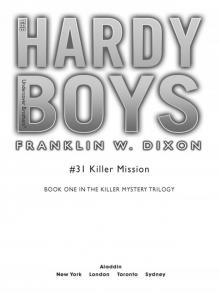 Killer Mission
Killer Mission The Mark of the Blue Tattoo
The Mark of the Blue Tattoo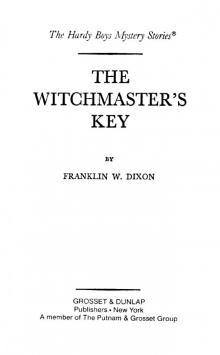 The Witchmaster's Key
The Witchmaster's Key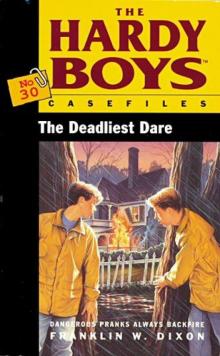 The Deadliest Dare
The Deadliest Dare Peril at Granite Peak
Peril at Granite Peak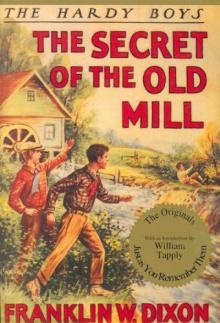 The Secret Of The Old Mill thb-3
The Secret Of The Old Mill thb-3 Rocky Road
Rocky Road The Demolition Mission
The Demolition Mission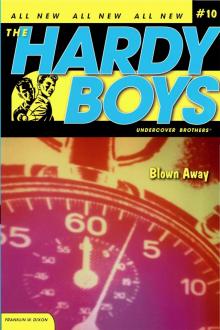 Blown Away
Blown Away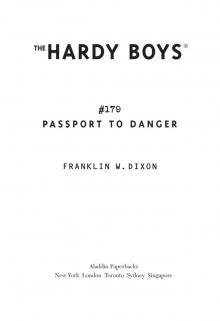 Passport to Danger
Passport to Danger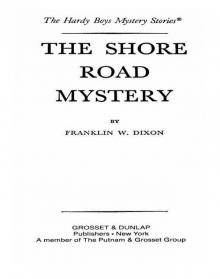 The Shore Road Mystery
The Shore Road Mystery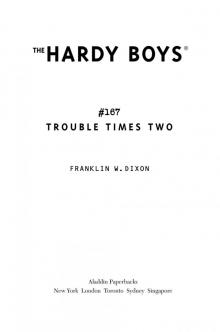 Trouble Times Two
Trouble Times Two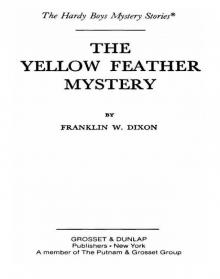 The Yellow Feather Mystery
The Yellow Feather Mystery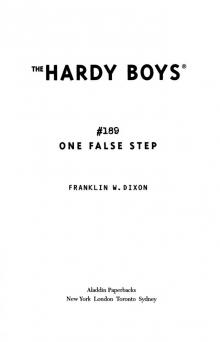 One False Step
One False Step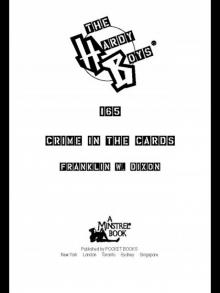 Crime in the Cards
Crime in the Cards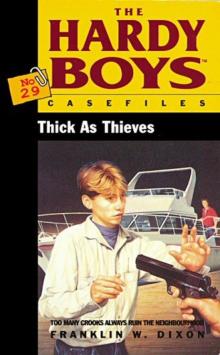 Thick as Thieves
Thick as Thieves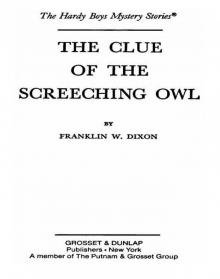 The Clue of the Screeching Owl
The Clue of the Screeching Owl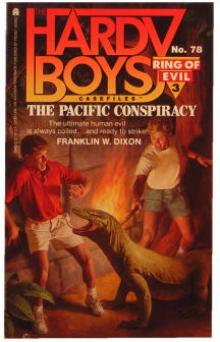 The Pacific Conspiracy
The Pacific Conspiracy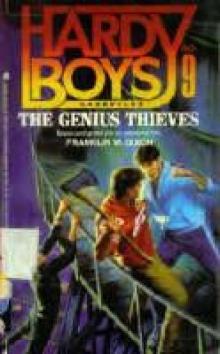 The Genius Thieves
The Genius Thieves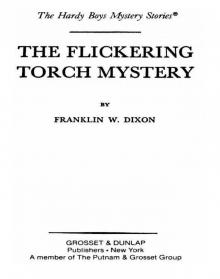 The Flickering Torch Mystery
The Flickering Torch Mystery Into Thin Air
Into Thin Air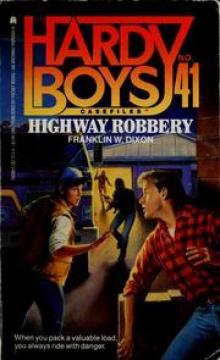 Highway Robbery
Highway Robbery Deadfall
Deadfall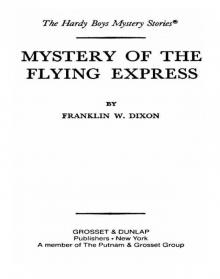 Mystery of the Flying Express
Mystery of the Flying Express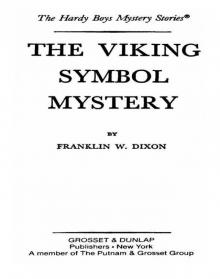 The Viking Symbol Mystery
The Viking Symbol Mystery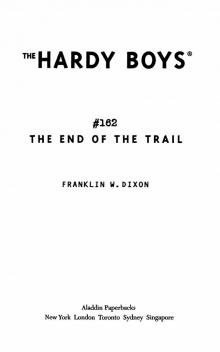 The End of the Trail
The End of the Trail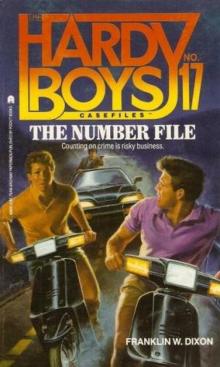 The Number File
The Number File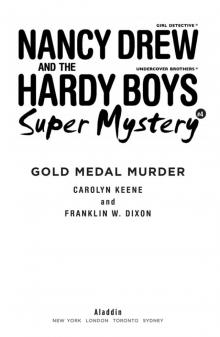 Gold Medal Murder
Gold Medal Murder Bound for Danger
Bound for Danger Collision Course
Collision Course The Madman of Black Bear Mountain
The Madman of Black Bear Mountain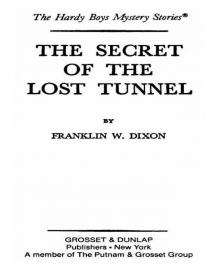 The Secret of the Lost Tunnel
The Secret of the Lost Tunnel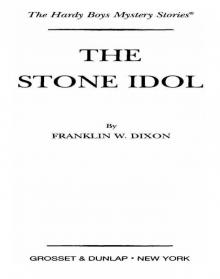 The Stone Idol
The Stone Idol The Secret of Pirates' Hill
The Secret of Pirates' Hill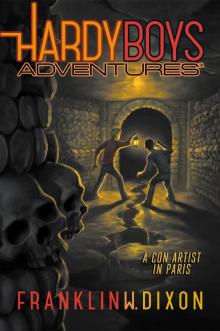 A Con Artist in Paris
A Con Artist in Paris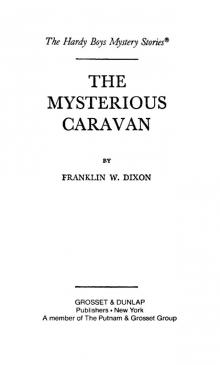 The Mysterious Caravan
The Mysterious Caravan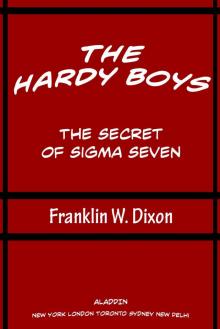 The Secret of Sigma Seven
The Secret of Sigma Seven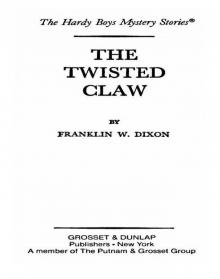 The Twisted Claw
The Twisted Claw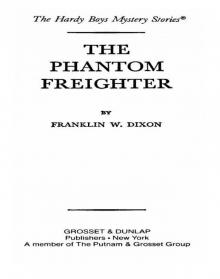 The Phantom Freighter
The Phantom Freighter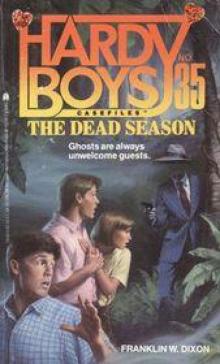 The Dead Season
The Dead Season The Video Game Bandit
The Video Game Bandit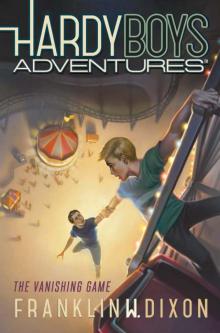 The Vanishing Game
The Vanishing Game Typhoon Island
Typhoon Island